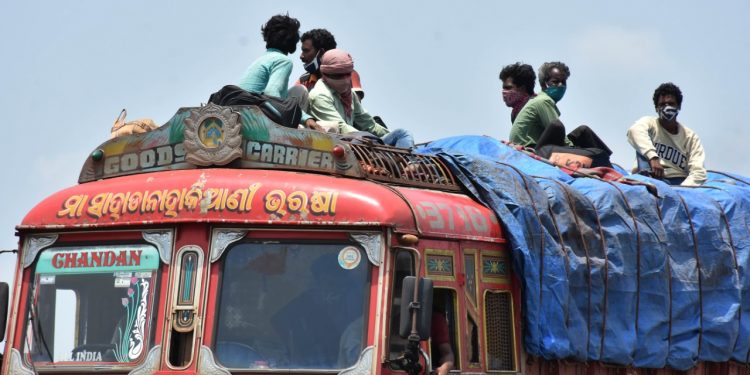Anil Singh
With the Supreme Court passing a detailed interim order May 28 about the transportation of migrant labourers, a ray of hope has dawned for the safe arrival of these migrants to their respective destinations. However, much also depends as to what extent the guidelines issues by the apex court are abided by the Centre and state governments.The matter would come up before the Supreme Court again June 5.
Since the promulgation of the lockdown March 25, the nation has been witnessing heart-rendering visuals of weary migrants agonizingly trudging along roads Acknowledged as the ‘backbone’ of the Indian economy, these migrant workers are not accorded a status corresponding to their huge contributions.
Imposition of lockdown with four hours’ notice March 25 caught millions of interstate migrant laborers unawares. Despite some arrangements of transport by rail or road having been put in place a month later to carry these workers to their respective destinations, large hordes still continued to march on foot. There are several crores of migrant workers in India, who are part of the 53.8 crore ‘unorganized’ workers across India. The Tughlaq-style mess in which migrant workers have been placed for no fault of theirs was due to lack of constructive planning.
Amidst this Centre-State tussle over interstate migrant workers, some experts have drawn attention to the Constitutional provisions. Article 217 read together with ‘List 1’ under the 7th Schedule of the Constitution clearly mentions ‘Item 81′, namely “inter-state migration and inter-state quarantine” to be within the powers of the Centre. The central government alone is empowered to deal with this in general. Undoubtedly, the list of states’ powers and responsibilities doesn’t have any mention of ‘interstate migrants’.But, both the Centre and the states are recipients of such labour and exporters as well.
While drawing attention to the Concurrent List of powers with which both the Centre and the states can legislate and administer, some experts have referred to entries such as Item 22 that mentions “trade unions, industrial and labour disputes” while item 24 cites “welfare of labour” and allied issues. Experts say these provisions benefitted the organised labour, while the unorganised labour remained ‘a pitch-black area under the lamp.’
Lamentably, even in orders issued by the Home ministry to deal with COVID-19 situation in the country, major problems concerning the most distressed sections and of the hungry unemployed workers remained ignored. The much-hyped economic package of `20-lakh crore, comprising 10 per cent of India’s GDP, promises relief and rehabilitation, mainly to assist corporates, MSMEs, banks, financial institutionsetc, and contains only a slice of it — a thin one, for the hardest-hit stranded unorganised migrant workers. It formed just 0.175 per cent of the much-touted `20 lakh crore economic package, which has recently been lowered to 0.155 per cent. In the wake of release of the economic package for migrant workers and small farmers, heavily favoring longer-term credit-focused proposals over a more direct approach like cash transfers, observers have called it a ‘loan-mela’ that offers no immediate relief to sections of the population most affected by the lockdown.
The announcements made in the second tranche amounting to `3.16 lakh crore of the economic package is a hotchpotch of nine different steps –three for migrant workers and the urban poor, two for small traders and vendors, two for farmers, one for India’s middle-class and one employment programme that involves tapping into a Supreme Court-mandated fund for afforestation that has thousands of crores piled up due to a lack of use of funds over the years. However, economists and market analysts opine that actual cash outlay by the Centre for this financial year will be far lower and could range between `5,000 crore and `14,750 crore. Financial experts are skeptical about impacts or consequences of these smaller scalpel-like moves.
The humanitarian crisis of migrant workers has reiterated the need for working out long-term policy measures through adequate legislation, financial resources and non-partisan approach so that such recurrence of tragedy could be averted. These workers ought to be hailed as economic warriors.
The writer is Executive Editor of News24 TV; views expressed here are personal.






































